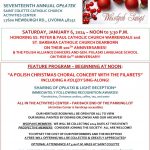Fifth Annual All Saints’-All Souls’ Pilgrimage, Prayer Service & Wypominki (Remembering)
Saturday, November 3, 2012 – Holy Cross Cemetery, Detroit
We were once again blessed with clear, sunshiny skies and a crisp autumn day for this annual event, one of the most revered for our organization. We began in the chapel for our General Membership Meeting and then began our event with an introduction by Vice President & Executive Director/Secretary Ms. Laurie A. Gomulka.
Ms. Gomulka described the Society as being a very unique organization, being the only west side Polish American organization dedicated to preserving Polonia’s history and heritage. She talked about the several unique events that the Society hosts every year and the common thread that weaves them together.
Our Seventh Annual Opłatek, which she stated would be held on Sunday, December 30, from 2 to 5 p.m. at St. Colette, will be the first to be held at the Society’s new headquarters, which has been relocated from St. Hedwig. The Society will honor historic St. Cunegunda-St. Barbara parishes and the Club Filarets of Troy. The Filarets Mixed and Women’s Choirs will perform. Of course, we will share the Opłatek, which brings to mind Wigilia, a time-honored tradition among Poles and Polish Americans.
Ms. Gomulka reminded those present that at Wigilia as we share the Opłatek and as we join together, we remember our departed, just as we remembered them on November 3 at the All Souls event. We set a place at the table for them and for the stranger who may be passing by who is cold and hungry, lost and forgotten.
She told the guests that the Society has hosted two Polish Wedding Parties-a unique event that no one else in our area or anywhere else, to our knowledge, has recreated-at least not quite as we have recreated it. When we think of the Polish wedding, we think perhaps of the movie, Polish Wedding, and the crudeness of how Polish Americans were portrayed in that movie. The things that come to mind that typically have been associated with the Polish wedding as propagated by American culture are the drunk at the bar, the fist fight, the Polish band with its accompanying polka and accordion player, which historically may be associated with a hokey kind of music. We think of the food-kiełbasa, for example-and the jokes often associated with it.
But, she went on to say, the Polish wedding is one of the most sacred and beautiful events of our culture or of any culture, starting with the parents’ blessing. This begins the symbolism of family ties that is intrinsically part of the entire wedding ceremony, from beginning to end. The bride kneeling down before her parents and receiving their benediction is a sign of reverence for family and a symbol of love of the parents for their daughter. As the couple enters the hall, the cook greets them with another blessing and the symbolism of bread and salt-wishes being bestowed upon the couple that they will never be lacking for anything throughout their lives.
The band is an interactive part of the wedding reception, representing the communal and familial nature of the wedding. The music is colorful. The songs are symbolic, traditional, and replete with deep meaning. Polish musicians created and still create compositions that are inspired by their surroundings and their love of family and friends, places and country, heritage and homeland, God and Church. Children, parents, grandparents, and entire extended families join in on the dancing and all of the events and festivities. The bride and groom aren’t sent away without everyone’s blessings, and then the closeness of the wedding continues the next day with poprawiny, during which the food, music, and merriment are all shared again.
And the annual All Saints’-All Souls’ prayer service and pilgrimage to the cemetery, with wypominki, is a time of bringing our loved ones who are gone to another place back into our circle again by naming their names aloud and calling them back to us. We believe they haven’t left us but are praying for us and with us, just as we pray for them and with them.
Ms. Gomulka went on to tie together the common thread that all of these events share. She used a word that she said she had heard the priest use the night before during All Souls’ Day Mass: the word “Solidarity.” She said it was a term that she loved in this context because it reminded her of our Polish roots and it also reminded her that we are linked together. Even our beloved dead are among us. We remember the stranger, the homeless who have no one to pray for them, and the graves that are unattended. And we ask the homeless to pray for us because we as Poles and Polish Americans believe that their prayers carry great weight.
The prayer service was led by Society member Lawrence Choraszewski. Cemetery Manager Greg Kolasa led the group on the cemetery tour and mentioned several prominent individuals, many Polish Americans, who are buried at Holy Cross. Along with Laurie Gomulka, he gave histories of some of the individuals. Among those whose graves were visited or who were mentioned were the original Gorno family of Gorno Ford, Stanley Romanowski of the Romanowski Post, the Livernois family, the Kramer family of the Kramer Theater fame, Detroit city councilman and founder of the Kronk Community Center John A. Kronk, numerous priests, including Rev. Joseph Janiga, Rev. John Bartkowiak, Rev. Alexander Wytrwal, and several Redemptorist priests, including Rev. Joseph Dustin. Also mentioned was gangster August J. Nykiel, a bar owner and one of the most successful bootleggers in Detroit who was born in Poland in 1896 and who was shot in his bar on June 27, 1928.
A pre-paid banquet was optional at Roman Village Cuciana in Dearborn, and approximately 20 pilgrims went on to the banquet where they enjoyed pizza, pasta, salad, and ice cream for dessert, and lots of reminiscing.
For Polish Americans on Detroit’s west side, Holy Cross Cemetery is a landmark. Nearly half of the gravestones in the cemetery bear Polish names, and many who continue to visit the cemetery today are Polish Americans who do so to be near and to remember their parents, grandparents, or great-grandparents. Polish organizations such as the West Side Detroit Polish American Historical Society and the Polish Genealogical Society of Michigan continue to host events at and pilgrimages to the cemetery, which many Polish Americans feel is and will continue to be one of the most beautiful of Detroit’s places. Some believe it still to be the cemetery that it was built to be: “the most beautiful Catholic cemetery in the nation.”


